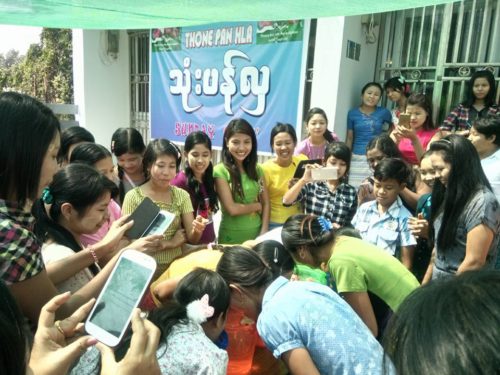In many countries in South and South East Asia the textile and clothing sector is contributing substantially to local economic development. This also applies to Myanmar: it constitutes an important industry with roughly 430 factories, employing around 340,000 people. It is expected that by 2018 the number of garment factories in Myanmar will increase to nearly 600 and the number of employees will rise to approach 600,000.
Over 90 percent of employees in the textile and clothing industry are young women, most typically between 16 and 27 years old. Local NGOs observe that many women stay in the factory until their first pregnancy and then return into their home villages. Since the poverty rate amounts to 37.5 percent in Myanmar, the income of the seamstresses is badly needed to support their families. Moreover, working in the garment factories is often the only possibility for young women from the rural regions in Myanmar to earn money and to emancipate them economically. This chance, however, also harbours great risks, because most often the women do not know their what legal rights are and are thus at risk of exploitation and debt. A significant number of garment workers are in debt because they send more money home to their families than they can rightfully afford.
In order to improve labour conditions in this sector, working women and men have to be encouraged to know and claim their rights. This purpose is supported by the regional project “Labour and Social Standards in the Textile and Clothing Sector in Asia”, which is implemented by the GIZ and commissioned by the German Federal Ministry for Economic Cooperation and Development (BMZ). The project is active in Bangladesh, Cambodia, Myanmar and Pakistan and is working together with China. In Myanmar, this project cooperates closely with SMART Myanmar.
Because the garment industry in Myanmar has a considerable potential for growth, job opportunities for hundreds of thousands of young women can be created. This, in turn, can contribute to their financial independence, if their work opportunities are compliant with labour and social standards.
Bangladesh saw a similar development in the past as the garment industry grew rapidly for decades. However, sewers were sometimes exploited and had no possibility to advocate for their rights. It took years until the first initiatives for the support of garment workers emerged. One of several initiatives was the "cafés for women", in which the women workers are informed about their rights and are supported to claim them. The experiences made in Bangladesh with these issues now serve to educate and inform the actions being undertaken in Myanmar. Two study missions have already been organized via cooperative efforts of the EU funded SMART Myanmar project, GIZ and the C&A Foundation, to exchange experience and knowhow between women's cafes in Bangladesh and the "Sunday Cafés" in Myanmar.
The Sunday Cafe 1 and Sunday Café 2 are run by the local civil society organization, Thone Pann Hla. The 2nd location opened in Hlaing Thayar Township, Yangon in January 2017. Garment workers meet up weekly at both locations with their friends on their day off to read books, relax and learn more about their rights through trainings, games and conversations among themselves.











